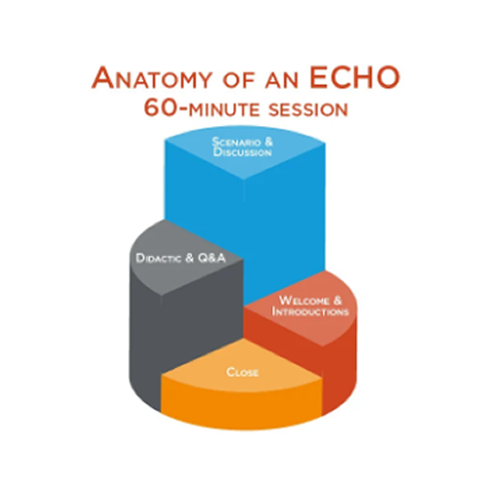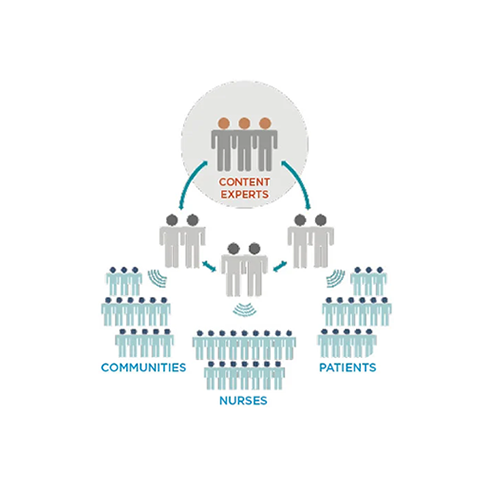Project ECHO® on Racism in Nursing to launch third series on health equity - Fall, 2023

Project ECHO® on Racism in Nursing is being conducted as part of the ongoing work of the National Commission to Address Racism in Nursing, a multi-organizational collaborative of leading nursing organizations to examine the issue of racism within nursing nationwide and the impact on nurses, patients, communities, and healthcare systems to motivate all nurses to confront systemic racism. Through ECHO®, the National Commission is offering this free tele-mentoring program that connects nurses with Diversity, Equity, and Inclusion (DEI) experts using brief lectures and case-based learning, and discussion.
The National Commission’s Project ECHO® on Racism in Nursing serves as a forum for nurses to increase their knowledge about how racism “shows up” in the profession and in healthcare and improves the skills needed to confront systemic racism and empowers nurses to become allies.
The Project ECHO®: Addressing Racism in Nursing series includes:
- Eight, 90 minute sessions
- Virtually delivered by subject matter expert faculty and mentors
- Case presentation and discussion
- Short lecture on a topic related to racism in nursing.
Series 3.0 - Fall, 2023
Join us as we explore the root causes of health inequities and discuss the concepts and strategies for taking action toward health equity in everyday practice. 1.5 CNE is available for each session of the series.
Sessions are scheduled for the following Wednesdays from 3-4:30pm ET:
- September 6
- September 20
- October 4
- October 18
- November 1
- November 15
- November 29
- December 13
Download and share our Series 3 Flyer [PDF] for more details on each session!
Review resources from prior sessions!
Series One (March – June, 2022) [PDF]
Series Two (September – December, 2022) [PDF]
Series Three
Session 1 Resources: Slidedeck [PDF] and recording, Additional Reading: When Power Makes Others Speechless, Health Equity-A Concept Analysis
Session 2 Resources: Slidedeck [PDF], recording, and Racism in America versus South Africa [YouTube]. Additional Reading: The political determinants of health—10 years on. (Kickbusch, I. 2015).
Session 3 Resources: Slidedeck [PDF] and recording. Additional Resources - Race - The Power of Illusion: Interview With Beverly Daniel Tatum (PBS.org), Kendi, Ibram X. How to be an Anti-Racist, 2019. (Columbia.edu), Trepagnier, Barbara. Silent Racism, 2010. Interview (youtube.com)
Session 4 Resources: Slidedeck [PDF] and recording, Additional Resources: Antiracist Documentation Practices — Shaping Clinical Encounters and Decision Making (2023) | New England Journal of Medicine [NEJM.org], Getting Called Out & How to Apologize [Youtube Video], Weathering: The Extraordinary Stress of Ordinary Life in an Unjust Society by Arline T Geronimus [audiobooks.com]
Session 5 Resources: Slidedeck [PDF] and recording. Additional Resources: Targeted Universalism: Policy & Practice. Othering & Belonging Institute at UC Berkeley (Berkeley.edu), A Theory of Racialized Organizations (American Sociological Review)
Session 6: Slidedeck [PDF] and recording. Additional Resources: American Academy of Nursing (AAN) AAN_2020 Critical Conversation on Health Equity and Racism Summary Report (2021), T. Coleman. Anti-Racism in Nursing Education: Recommendations for Racial Justice Praxis (2020), K. Crenshaw. Demarginalizing the Intersection of Race and Sex: A Black Feminist Critique of Antidiscrimination Doctrine, Feminist Theory and Antiracist Politics (1989), C.Moorley, et al. Dismantling structural racism: Nursing must not be caught on the wrong side of history (2020).
Session 7: Slidedeck [PDF] and recording. Additional Resources: A.Jemal Transformative Consciousness of Health Inequities: Oppression Is a Virus and Critical Consciousness Is the Antidote (2018), Interrupting Criminalization. In It Together (Toolkit): A Framework for Conflict Transformation In Movement-Building Groups (see page 44), J.P. Wyatt & G.G. Ampadu Reclaiming Self‑care: Self‑care as a Social Justice Tool for Black Wellness (2001), K.E.Edwards Aspiring Social Justice Ally Identity Development: A Conceptual Model (2006), The Psychosis of Whiteness': 'We need radically new, different ideas' to tackle racism. France 24. (msn.com)
Learn more about the Project ECHO® Model!
The Project ECHO® Model is an “all teach, all learn” approach to knowledge-sharing throughout health systems and communities. The multi-directional flow of evidence-based information through case-based learning and tele-mentoring allows for interactive and engaging learning through dialogue. The National Commission to Address Racism in Nursing is excited to use this model to redefine how nurses learn about racism, allyship, and tools and resources to confront and dismantle racism within the nursing profession and healthcare
How is the Project ECHO® Model structured?
Each 60-minute session includes:
- Welcome and introduction
- Didactic presentation and Q&A
- Case Presentation and Discussion
- Session closing
Moving Knowledge
Project ECHO transforms the way education and knowledge are delivered to reach more people in rural and underserved communities.
This low-cost, high-impact intervention is accomplished by linking inter-disciplinary specialist teams with multiple clinicians through teleECHO programs. Experts mentor and share their expertise across a virtual network via scenario-based learning, enabling clinicians to apply best practices and lessons learned in their own communities.
Benefits of Becoming a Partner in the ECHO Movement
- Better access for rural and underserved communities
- Reduced disparities
- Better quality and safety
- Rapid dissemination of best practices
- Promote consistency in care and practice
- Greater efficiency
Questions? Email us

